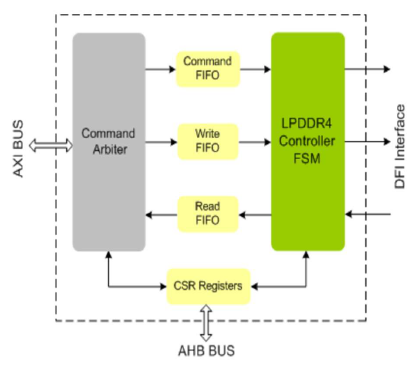Description
LPDDR4 is full-featured, easy-to-use, synthesizable design, compatible with LPDDR4 JESD209-4, JESD209- 4A, JESD209-4B, JESD209-4C, JESD209-4X and JESD209-4Y (Proposed) specification and DFI-version 4.0 or 5.0 specification Compliant. Through its LPDDR4 compatibility, it provides a simple interface to a wide range of low-cost devices. LPDDR4 Controller IP is proven in FPGA environment. The host interface of the LPDDR4 can be simple interface or can be AMBA AHB, AMBA AHB-Lite, AMBA APB, AMBA AXI, AMBA AXI-Lite, Tilelink, OCP, VCI, Avalon, PLB, Wishbone or Custom protocol.

Features
-
Supports LPDDR4 protocol standard JESD209-4, JESD209-4A, JESD209-4B, JESD209-4C, JESD209-4X and JESD209-4Y (Proposed) Specification.
-
Compliant with DFI version 4.0 or 5.0 Specification.
-
Supports up to 16 AXI ports with data width upto 512 bits.
-
Supports controllable outstanding transactions for AXI write and read channels
-
Supports in port arbitration and multi-port arbitration.
-
Supports user programmable page policy. • Closed page policy • Open page policy
-
Supports Error Checking and correction (ECC).
-
Supports retry on ECC error, with retry limit user controllable.
-
Supports high clock speeds in ASIC and FPGA.
-
Supports low latency for write and read path.
-
Supports reordering of transactions for higher performance.
-
Supports up to 32 GB device density.
-
Supports the X8 and X16 device type.
-
Supports on-the-fly in burst lengths.
-
Supports Byte mode.
-
Supports Single-ended mode.
-
Supports Write leveling.
-
Supports CA training and DQ Vref training.
-
Supports all speed grades as per specification.
-
Supports Mode Registers programming.
-
Supports Sequential burst type.
-
Supports Programmable burst lengths of 16 and 32.
-
Supports Multiple Outstanding transaction.
-
Supports In-port Arbitration using QoS.
-
Supports Write Data Mask operation.
-
Supports Data Bus Inversion for Write and Read.
-
Supports CRC and ECC for Write and Read Operations.
-
Supports Self Refresh and Power Down operation.
-
Supports Precharge Command modes.
-
Supports 1:4 Controller to DFI PHY frequency ratio.
-
Supports Programmable clock frequency operation.
-
Fully synthesizable.
-
Static synchronous design.
-
Positive edge clocking and no internal tri-states.
-
Scan test ready.
-
Simple interface allows easy connection to Microprocessor/Microcontroller devices.
-
Built in self-test to test all locations in memory to identify damaged locations.
Deliverables
-
The LPDDR4 interface is available in Source and netlist products.
-
The Source product is delivered in Verilog. If needed VHDL, SystemC code can also beprovided.
-
Easy to use Verilog Test Environment with Verilog Testcases.
-
Lint, CDC, Synthesis, Simulation Scripts with waiver files.
-
IP-XACT RDL generated address map.
-
Firmware code and Linux driver package.
-
Documentation contains User's Guide and Release notes.
![]()